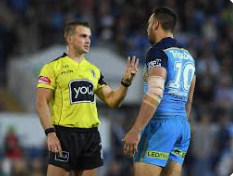There is one award in team sport that not many people can claim. Gary Lineker, the former England international striker (now a sports commentator and television personality) is one famous example, a lesser-known Algerian by the name of Abdelhamid Salhi, who enjoyed at 22-year career as a player
(and later as a coach), is another. The great Pele, currently a UNICEF Goodwill ambassador and United Nations ambassador, has achieved many amazing awards but he has never gained this accolade, even though as J.B. Pinheiro, the Brazilian ambassador to the United Nations, said on Pele’s retirement, “Pele played football for twenty-two years, and in that time he did more to promote world friendship and fraternity than any other ambassador anywhere.”
What was it that Lineker and Salhi did and Pele did not? We should actually re-write that and ask what it was that Lineker and Salhi did not do and Pele did do. In a senior career which spanned 16 years and 567 competitive games, Lineker never once received a booking (yellow card) nor was he ever sent off (red card); the same applied to Salhi in over one thousand competitive matches. In contrast, Pele, despite his success in promoting world friendship, was often booked and sent off.
There are different offences for which a player may be booked in soccer: Anything that can be deemed as unsporting behaviour; Dissent by word or action; Persistent infringement of the laws; Delaying the restart of play; Not retreating the full ten yards at a free-kick or corner; Entering or re entering the pitch without the referee’s permission; Deliberately leaving the pitch without the referee’s permission. Players can be sent off for receiving two yellow cards or for Serious foul play; Violent conduct; Spitting at an another person; Denying an obvious goal-scoring opportunity by handling the ball (if not the goalkeeper); intentionally handling the ball outside the goal area.
If we pause for a moment, therefore, we will realise that if someone gets booked they must be one of the following: they must either be cheeky (showing disrespect), clumsy, dirty, silly, risky, ignorant (not knowing or understanding the rules), or inept. None of those are attributes we would wish to develop. Salhi had another word for it: “In my position I had to defend and make tackles to stop a counter-attack or slow it down but I never cheated.” He went on to say that, “You will never get into trouble if you put respect first; that’s the golden rule for fair play and clean football. I have always observed the rules religiously. I have never contested the decision made by the referee or argued with him about anything even when I am the victim of a bad tackle or another offence.” And if a player receives a red card, perhaps we just need to say that he takes the sport too seriously.
There are some people who take the view that pupils at school should not be booked or sent off; it is argued that a good schoolmasterly-word should be sufficient. That may make sense only if the same schoolmasterly-word is all that is given when the same pupil misbehaves in class or the playground. The latter scenario, however, does not occur; children at school are given detention, demerits and all sorts of other forms of discipline when they step out of line. They need to learn early on that what happens on a sports field mirrors what happens in life. If sport is being taken seriously, we need to take it seriously; a player receiving a red card (or numerous bookings) must be banned for some matches. Their actions have consequences, which will affect not only them but also their team.
As coaches, we do in fact need to teach our youngsters not to be booked or sent off at school level and beyond. We must teach them to respect the opposition and referee and train them so they are not clumsy, dirty, silly, inept or ignorant. A yellow or red card at school should be treated very seriously, in the same way that poor behaviour or unacceptable work in the classroom is dealt with.
It is perfectly possible for a player, even a highly successful player, not to be booked or sent off. There should not even be an award for it, as it should be so natural that everyone would gain it. We will all promote world friendship and fraternity much more if we do that. As Pele himself recognised: “Every kid around the world who plays soccer wants to be Pele. I have a great responsibility to show them not just how to be like a soccer player, but how to be like a man.” We all have a great responsibility to show bookings are unnecessary: people must turn up and play, correctly!




